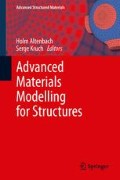Abstract
The paper discusses the effect of stress state on ductile damage behavior. The continuum model has been generalized to take into account stress state dependence of the damage criterion with branches corresponding to different damage mechanisms depending on the stress triaxiality and the Lode parameter. Experiments with differently notched tension and shear specimens taken from aluminum sheets are used to identify basic material parameters. Additional series of micro-mechanical numerical analyses of void containing unit cells have been performed to be able to get more insight in the complex damage and failure behavior of ductile metals. These calculations cover a wide range of stress triaxialities and Lode parameters. The numerical results are used to show general trends, to develop equations for the damage criterion, and to identify material parameters of the continuum model.
Access this chapter
Tax calculation will be finalised at checkout
Purchases are for personal use only
References
Borvik, T., Hopperstad, O.S., Berstad, T.: On the influence of stress triaxiality and strain rate on the behavior of a structural steel. Part II. Numerical study. Eur. J. Mech. A/Solids 22, 15–32 (2003)
Bao, Y., Wierzbicki, T.: On fracture locus in the equivalent strain and stress triaxiality space. Int. J. Mech. Sci. 46, 81–98 (2004)
Bonora, N., Gentile, D., Pirondi, A., Newaz, G.: Ductile damage evolution under triaxial state of stress: theory and experiment. Int. J. Plast. 21, 981–1007 (2005)
Oh, C.K., Kim, Y.J., Park, J.M., Baek, J.H., Kim, W.S.: Development of stress-modified fracture strain for ductile failure of API X65 steel. Int. J. Fract. 143, 119–133 (2007)
Bai, Y., Wierzbicki, T.: A new model of metal plasticity and fracture with pressure and Lode dependence. Int. J. Plast. 24, 1071–1096 (2008)
Brünig, M.: An anisotropic ductile damage model based on irreversible thermodynamics. Int. J. Plast. 19, 1679–1713 (2003)
Brünig, M., Albrecht, D., Gerke, S.: Numerical analyses of stress-triaxiality-dependent inelastic deformation behavior of aluminum alloys. Int. J. Damage Mech. 20, 299–317 (2011)
Gao, X., Zhang, T., Hayden, M., Roe, C.: Effects of the stress state on plasticity and ductile failure of an aluminum 5083 alloy. Int. J. Plast 25, 2366–2382 (2009)
Kuna, M., Sun, D.Z.: Three-dimensional cell model analyses of void growth in ductile metals. Int. J. Fract. 81, 235–258 (1996)
Zhang, K.S., Bai, J.B., Francois, D.: Numerical analysis of the influence of the Lode parameter on void growth. Int. J. Solids Struct. 38, 5847–5856 (2001)
Kim, J., Gao, X., Srivtsan, T.S.: Modelling of crack growth in ductile solids: a three-dimensional analysis. Int. J. Solids Struct. 40, 7357–7374 (2003)
Gao, X., Wang, T., Kim, J.: On ductile fracture initiation toughness: effects of void volume fraction, void shape and void distribution. Int. J. Solids Struct. 42, 5097–5117 (2005)
Gao, X., Zhang, G., Roe, C.: A study on the effect of the stress state on ductile fracture. Int. J. Damage Mech. 19, 75–94 (2010)
Bao, Y., Wierzbicki, T.: On the cut-off value of negative triaxiality for fracture. Eng. Fract. Mech. 72, 1049–1069 (2005)
Brünig, M., Chyra, O., Albrecht, D., Driemeier, L., Alves, M.: A ductile damage criterion at various stress triaxialities. Int. J. Plast. 24, 1731–1755 (2008)
Driemeier, L., Brünig, M., Micheli, G., Alves, M.: Experiments on stress-triaxiality dependence of material behavior of aluminum alloys. Mech. Mater. 42, 207–217 (2010)
Brünig, M., Albrecht, D., Gerke, S.: Modelling of ductile damage and fracture behavior based on different micro-mechanisms. Int. J. Damage Mech. 20, 558–577 (2011)
Acknowledgments
Financial support from the Deutsche Forschungsgemeinschaft (German Research Foundation, BR1793/12-1) is gratefully acknowledged.
Author information
Authors and Affiliations
Corresponding author
Editor information
Editors and Affiliations
Rights and permissions
Copyright information
© 2013 Springer-Verlag Berlin Heidelberg
About this chapter
Cite this chapter
Brünig, M., Gerke, S., Hagenbrock, V. (2013). Micro-Mechanical Numerical Studies on the Stress State Dependence of Ductile Damage. In: Altenbach, H., Kruch, S. (eds) Advanced Materials Modelling for Structures. Advanced Structured Materials, vol 19. Springer, Berlin, Heidelberg. https://doi.org/10.1007/978-3-642-35167-9_9
Download citation
DOI: https://doi.org/10.1007/978-3-642-35167-9_9
Published:
Publisher Name: Springer, Berlin, Heidelberg
Print ISBN: 978-3-642-35166-2
Online ISBN: 978-3-642-35167-9
eBook Packages: Chemistry and Materials ScienceChemistry and Material Science (R0)

